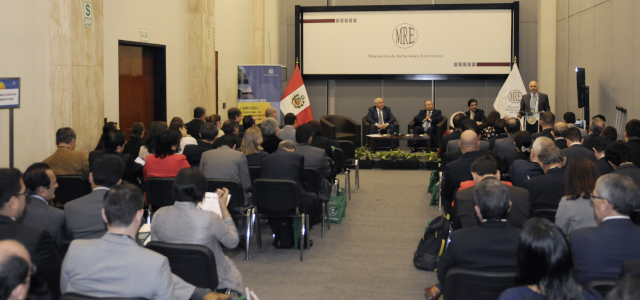Since August 2018 GWP South America has focused on transboundary waters, along with UNESCO Latin America and Caribbean, UNESCO Brazil, PHI, Ceregas, UNECE and the Brazilian Water Agency, Uruguayan Environmental Ministry; Peruvian External Affairs Ministry, Peruvian National Agency of Water, Peruvian Ministry of Agriculture and irrigation, under the framework of the International Water Law Programme of GWP Central and South America.
GWP Regional Chair Carlos Saito and Regional Coordinator Alejandra Mujica were invited by the Peruvian External Affairs Ministry to the “International symposium of transboundary waters in Latin America”on 8-9 November. At the event, professor Saito made some reflections:
“On the continent scale, we must promote a planned diagnosis of all transboundary basins and several issues that characterize a change of approach to integrated water resources management, well beyond the traditional approach based on international water law. The IWRM Toolbox is an important tool in supporting this evolution, and the IWRM Toolbox Teaching Manual reinforces this path, suggesting 6 basic disciplines around which we must organise capacity development. Another important aspect to consider is that cross-border agreements are usually concluded between states, and we need to listen to the voices of local communities, especially when dealing with traditional or indigenous communities. There are local spiritual values and local water management practices that are local in character and often state-level agreements do not reflect concerns or interests of communities that live on the border or in transboundary basins,” said Saito.
Alejandra Mujica highlighted that “transboundary water bodies are almost the half of our region. Cooperation is not only essential for effective and equitable water management, but also for sustainable development, regional integration and peace.”
In addition to participating in the international event in Lima, GWP South America and Partners also organised an International Water Law course with emphasis on underground water (read about it here, in Spanish); a seminar entitled "Update in the implementation of SDG 6.5.2 in Latin America and the Caribbean", and a workshop on “Underground waters and the state of art in the implementation of 6.5.2 for focal points” (read about it here, in Spanish).

